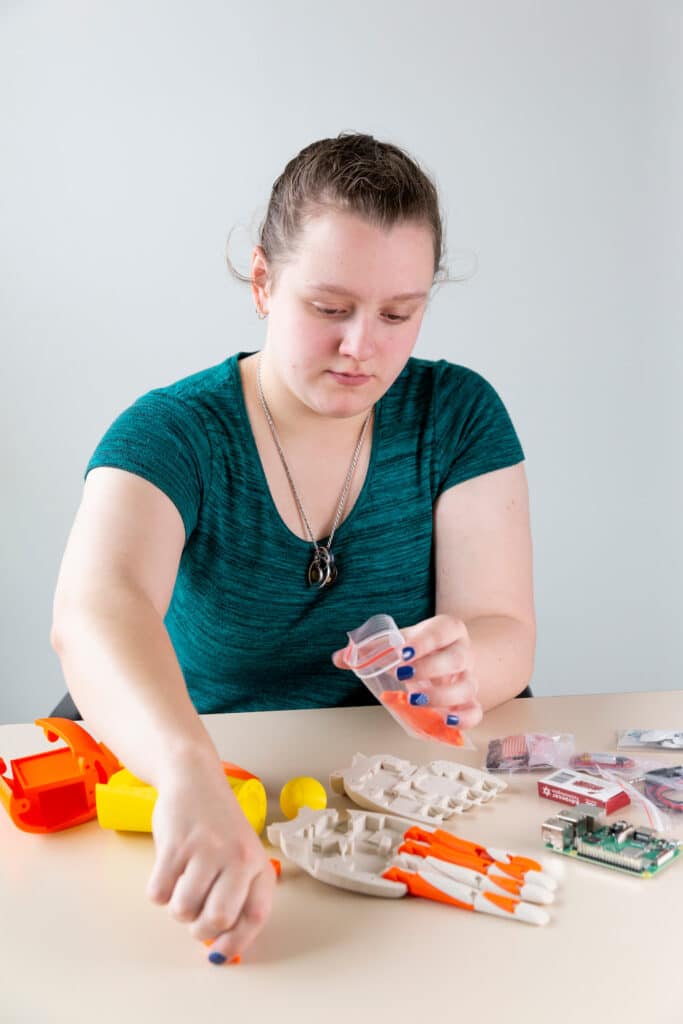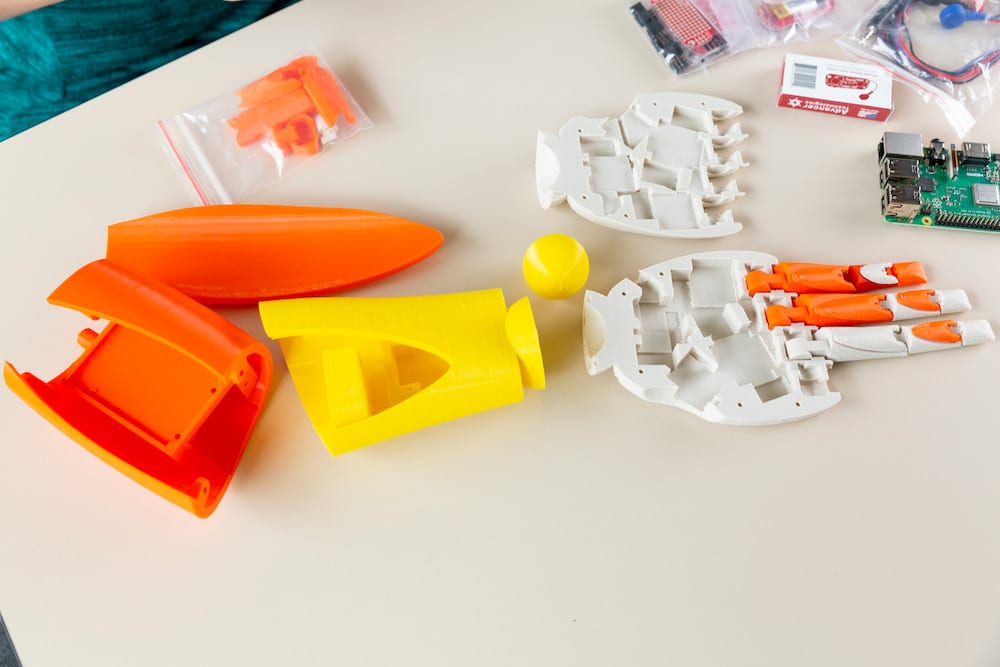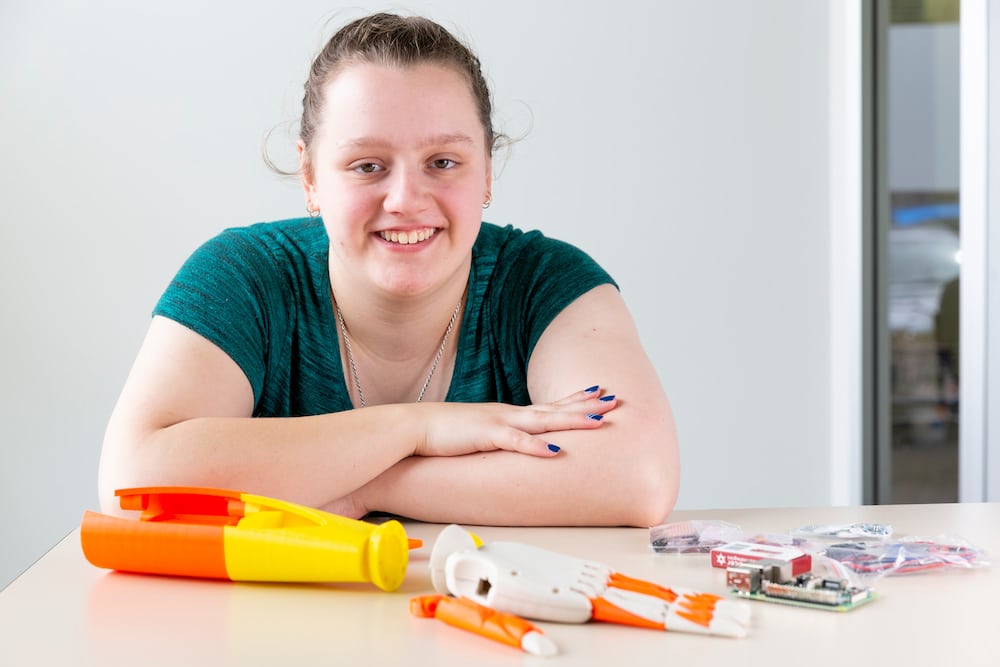When Canberra College 2020 Year 12 graduate Catriona Cochrane first saw a movie from the ‘Transformers’ franchise, she set her sights becoming an engineer, to build a similarly awe-inspiring robot in the future.
“I’m still working towards that one,” Ms Cochrane said.

Throughout high school, the desire to do it herself fuelled her interest in science, technology, engineering and maths (STEM), and in 2020 she was the recipient of an ACT Government Girls in STEM grant.
The $2,000 reward went towards materials for her robotics project, which is a prosthetic hand designed to receive signals from nerves impulses rather than muscles to prompt movement.
“I had two ideas, and I couldn’t pick between which one I wanted to do.”
The first was to build a ‘Transformer’, the second was to create a device that takes thoughts from nerves in the brain and puts them into words, advancing the technology used by late theoretical physicist Stephen Hawking, who lost control of his speech and used a device that read his facial muscles to communicate.
Ms Cochrane said her goal was to bypass reading the muscles.
“There’s a lot of people with conditions similar to his that don’t have access to those face muscles, or any muscles really, and it ends up being a real struggle trying to communicate with them,” she said.
“Those are still ideas that I really want to work on maybe a bit later in life, when I’ve got more knowledge and expertise.
“And my mum was like, ‘Well, why don’t you try and do something that’ll take factors of both of those that you can then improve on, that will help you with them later?’”
Ms Cochrane loves science fiction and literature, she’s currently writing a novel, and her project clearly benefits from both imagination and a mechanical mind.
Plucky enough to pick up the phone
Throughout high school, Ms Cochrane participated in UNSW Canberra’s Young Women in Engineering program, before becoming a mentor to younger girls while in college.
This helped her establish a network of experts who were happy to help when she had an engineering-related question.
“They’re so funny when it comes to women in engineering; they see a girl that’s interested in STEM and they’re like, ‘A woman! Interested in engineering! This is amazing!’”
But when it came to prosthetics, she needed advice from medical professionals, so she picked up the phone and called the general line at Canberra and asked to be put through to the relevant department.
“I’m very lucky to have the family that I do, because they’re always like, ‘Just do it, and if they say no, they say no, you can try and find someone else – but you won’t know unless you hit that button’.”
Luckily, Ms Cochrane heard back from prosthetists offering their expertise.
“I got calls and emails back being like, ‘Yes, we’d love to help you! What do you need? We can show you our facilities’ and all that sort of thing.”
She said her biggest piece of advice for young women with a dream like hers was to ask for support.
“Especially if you’re doing something that nobody thinks you want to do.”
“With engineering, I had a bunch of people being like, ‘Oh, but you’re really good at your languages’ and they wouldn’t look at the maths and science and stuff like that.”
When Ms Cochrane let her teachers know her plan was to pursue engineering, they said, ‘Actually, we can help you get there’.
Succeeding in a male-dominated environment

Ms Cochrane studied a range of humanities and STEM subjects at Canberra College, and each had a different balance of genders.
She said her literature class had “maybe five or six guys” and the rest of it was mainly women.
“But they did well to keep up with us, we just sort of have these massive class discussions and bounce off each other.”
The tables turned in her STEM subjects where she was often one of the only young women in the class, especially in electronics, mechatronics and specialist maths.
“I think we had almost half-half for physics, which was really nice.”
She said it was difficult to make friends in male-dominated classrooms at first, and “keeping up with the guys is probably the hardest bit.”
Her male classmates were confident and competitive, which sometimes led to self-doubt.
“You see the guys doing really, really well and you’re like, I want to be that good. But I don’t think I can be.
“I’m going to try anyway. But I still don’t think I can be.”
Ms Cochrane won the Australian Defence Force Future Innovator’s Award at Canberra College at her graduation in December 2020.
In 2021 she is set to study a UNSW Bachelor of Electrical Engineering at ADFA campus in Canberra and continue work on the 3D printed robotic prosthetic.
This story is part of the Canberra Daily Class of 2020 series.



